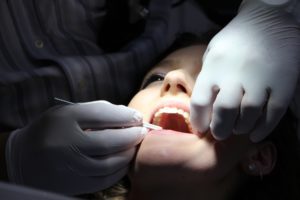Bright red gums that are swollen and tender, a receding gum line, and loose teeth are all symptoms of periodontal disease, otherwise known as gum disease. The disease itself can be mild, moderate or severe and is found amongst 47.2% of Americans, meaning nearly half of the U.S. population is in need of care or treatment. The most severe form of periodontal disease is periodontitis, while the mild form is known as gingivitis. During routine cleanings, dentists scale teeth to prevent gum disease. However, if you have advanced signs of gum disease the dentist will perform periodontal scaling, which includes scaling teeth and root planing.

Periodontal scaling is the first step to treating gum disease because it ultimately removes bacteria that could infect the tooth. If it goes untreated, it can cause the tooth or teeth to fall out. While this is extreme, most believe gum disease is fairly benign. Many are surprised to learn that periodontal disease is a chronic inflammatory disease and therefore increases the risk of other chronic inflammatory diseases like diabetes and heart disease. Fortunately, periodontal disease is reversible through detection and treatment.
Gum Disease Detection:
During routine exams the dentist and hygienist will measure the gums to check for gum disease. They will measure from the top of the gum line to where it attaches to the tooth. This pocket should be 1 to 3 millimeters in depth if the gums are healthy. Once these pockets reach 4 millimeters or beyond and patient is exhibiting other classic signs of gum disease like swollen gums, bad breath and build-up. If that is the case, the dentist or hygienist will perform periodontal scaling.
Periodontal Disease Treatment:
When plaque, bacterial toxins and tartar are deposited in between the tooth and the gum, the gums get infected and swollen creating a bigger pocket, ultimately resulting in the gums detaching from the tooth. During periodontal scaling the dentist will use a metal scaler to reach below the gum line to remove all of this toxic buildup. This standard treatment for periodontal disease can be compared to removing a splinter from a finger.
The next step in periodontal scaling is root planing, where the dentist smooths out the rough area of the root’s surface to keep bacteria, plaque and tartar from re-adhering underneath the gum line. This process is much like the first stage in scaling, the difference is that the scaler goes much deeper into the gums. This basically helps the gums heal and reattach to the tooth.
Periodontal scaling can take between 2 and 4 visits to complete depending on severity. Many patients worry that the process is painful. In truth, it really depends on your situation and the sensitivity of your gums. For more severe cases, the dentist will use an anesthetic if necessary.
The third step or treatment option for reversing periodontal disease is undergoing periodontal surgery. This is only for the most extreme cases where the bone has been infected.
Periodontal Scaling After-care:
As mentioned earlier, periodontal scaling can be compared to removing a splinter from a finger. Once the splinter is removed the swelling goes away and the skin heals. The is true for the gums. Once build-up is removed by periodontal scaling, the swelling will reduce and the gums will heal. Post-treatment, your gums will be sore for a couple of days and the dentist will prescribe a mouth rinse to use to protect against infection
Whether you suffer from periodontal disease or not, everyone is at risk. The best way to prevent periodontal disease and to care for your gums after periodontal scaling is to brush your teeth twice a day (including your gums) and floss regularly (at least once a day).
In addition, to maintaining healthy gums by brushing and flossing, Dr. Dougherty and Dr. Adhikari recommend getting a professional cleaning every 6 months. Prevention is the best way to care for your gums and it starts with removing build-up regularly and monitoring gum pockets for signs of periodontal disease. To make an appointment at Artistic Dental call (602)-840-5400. Our office is conveniently located on 24th St. and Campbell Ave. in Phoenix.
